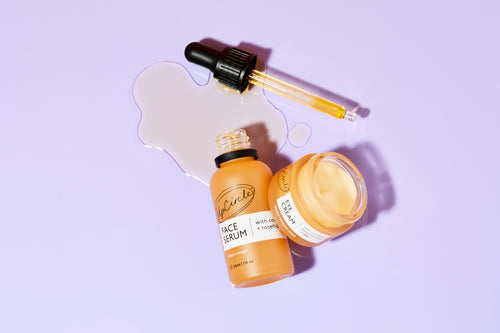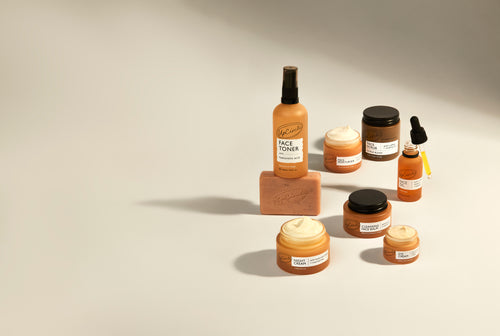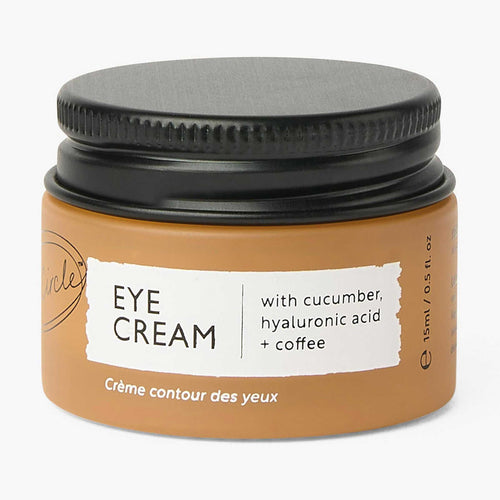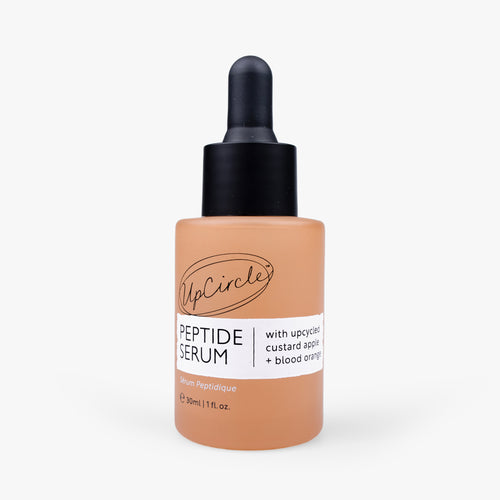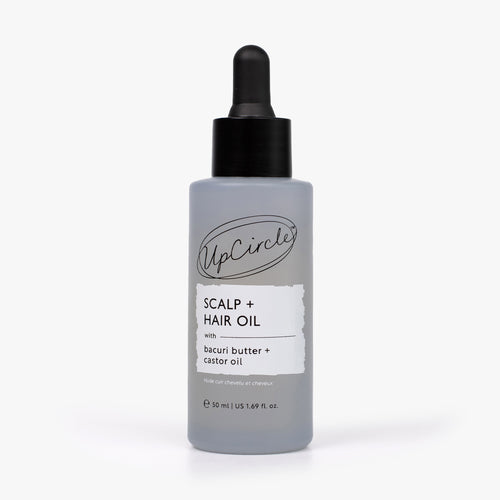With remote working, doom scrolling, and Netflix marathons, we're all spending more time than ever in front of screens. While we might be aware of the impact blue light can have on our sleep cycles, even if we don’t always turn our phones off, the impacts on our skin are less well-known.
Could blue light cause skin damage or speed up ageing? We’ll explain what you need to know and explore the best ways to protect your skin.
What is blue light, and why should we care?
Blue light, or high-energy visible light (HEV), is a short-wavelength light. While it’s naturally emitted by the sun, it can also be emitted artificially by digital devices like phones, tablets, laptops, and LED lights.
While this type of light isn’t as intense as UV radiation, blue and violet light penetrates deeper into the skin than UVA and UVB rays. As we’re constantly exposed – just look at your average daily screen time – to blue light, the cumulative effects can begin to take a visible toll on your skin’s health.
Blue light and skin: what the science says
Before we dive into what some studies say about the impact of blue light on skin, it’s important to note that even though blue light from the sun is far more intense than from screens, we need to consider the cumulative exposure we’re getting.
It’s also been observed that people with darker skin tones (Fitzpatrick types III–VI) are more likely to experience pigmentation from blue light exposure.
Recent studies have shown that excess blue light exposure can cause damage to the skin over time. Here’s how:
- Oxidative stress: Blue light triggers the production of free radicals, which damage cells such as those responsible for producing collagen and elastin. This oxidative stress can accelerate visible signs of ageing on the skin.
- Hyperpigmentation: Exposure to blue light can worsen melasma and uneven skin tone, especially in medium to deeper skin tones.
- Skin barrier disruption: Long exposure to high-energy blue light causes skin barrier damage, which might make it more difficult for your skin to retain moisture and protect itself.
- Sleep cycle interference: Light suppresses melatonin, and the greatest response is from short-wavelength blue light. Exposure at night can disrupt melatonin production, indirectly affecting how your skin repairs and regenerates.
Does blue light from screens damage skin?
We know our screens are small but mighty, but are they powerful enough to cause our skin damage? Unfortunately, the answer is yes. However, it’s important to remember that the intensity of blue light emitted from our screens is significantly less than the exposure we get from the sun.
Most people are aware of the dangers of UV light, taking the time to protect themselves from burning with SPF and breaks from the sun by seeking shade. But, the same can’t be said for blue light.
As we’re not typically taught about the dangers of prolonged exposure to blue light – even from less intense sources like phones and tablets – we don’t tend to take precautions or breaks. Blue light might not burn like UV light does, but it accelerates invisible ageing, pigmentation, and inflammation.
Signs of blue light skin damage
So, how do you know if those extra few hours of screen time per week are adding up and impacting your skin? Here are some classic signs that blue light has started to damage your skin:
- Dullness or lack of glow
- Fine lines and wrinkled skin
- Uneven tone or stubborn pigmentation
- Dry, stressed, or sensitive skin that feels harder to soothe
It’s important to note that if you already struggle with your skin – think acne, inflammation, or pigmentation – then blue light can make these issues more persistent and harder to manage.
How to prevent blue light skin damage
Don't worry, we’re not going to tell you to go completely offline to protect your skin, though a digital detox now and again doesn’t hurt.
Here are some practical ways to defend your face from blue light damage:
- Use night mode or a blue light filter on all your screens. Some devices have options to automatically set your screen to night mode, at sunset or at a set time.
- Take regular screen breaks using the 20-20-20 rule: every 20 minutes, look at something 20 feet away for 20 seconds. Avoid screens one to two hours before bed to support your skin’s overnight repair.
Protective skincare for your skin barrier
To keep your skin as healthy as possible, try to treat blue light skin protection as you (should) treat SPF – every day, rain or shine.
Strengthen your skin barrier with protective skincare that is formulated with natural ingredients that defend, heal, and hydrate, such as:
- Vitamin C – Neutralises free radicals before they have the chance to cause damage to your cells. Vitamin C also stimulates collagen production.
- Niacinamide – Fades discolouration and hyperpigmentation, as well as strengthens the skin’s natural barrier.
- Aloe Vera – Soothes inflammation, provides hydration, and supports cell regeneration.
- Sea buckthorn or turmeric – Anti-inflammatory powerhouses that also moisturise and nourish the skin.
- Algae – Protects against free radical damage and absorbs blue light.
Top tip: Apply antioxidant-rich serum and moisturiser before turning on your devices in the morning. Get ahead of blue light before it can cause damage!
At UpCircle, our products are brimming with antioxidants and skin-repairing ingredients, which are perfect for fighting blue light skin damage, sustainably. Here are some of our top picks for protective skincare.
- Peptide Serum with Custard Apple + Blood Orange – Our peptide serum is formulated with niacinamide and vitamin C, as well as antioxidant upcycled custard apple.
- Face Moisturiser with Vitamin E – Our face moisturiser is deeply moisturising, enriched with antioxidant vitamin E as well as aloe vera.
- Night Cream with Hyaluronic Acid + Niacinamide – Our night cream replenishes the skin’s natural barrier. Upcycled blueberry, rich in Vitamin A, protects against blue light and is a source of pro-retinol that works to minimise the signs of ageing on skin.
Screen time isn’t going anywhere – even if we wish it would! But the more we understand the impact of blue light, the better we can protect our skin. From antioxidant products to conscious screen habits, small changes can go a long way.
See our collection of antioxidant-rich, sustainable skincare to help protect, restore, and get your glow back – naturally.

